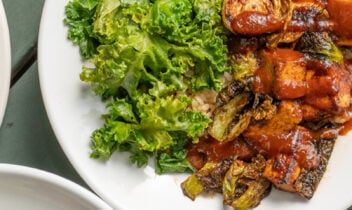About The Buzz: Asthma Symptoms Lessened by Eating Fruits and Veggies?
WHAT THEY’RE SAYING
A diet rich in fruits and vegetables can help decrease asthmatic episodes in those diagnosed with asthma.
WHAT THIS MEANS
Nearly 25 million people in the United States are diagnosed with asthma, a chronic lung disease that causes inflammation and narrowing of the airways.1 The disease is characterized by recurring periods of wheezing (a whistling sound when you breathe), chest tightness, shortness of breath, and coughing. While there is no cure for asthma, a person’s lifestyle can greatly impact the frequency and severity of the condition. A person with asthma can avoid certain triggers to help manage symptoms. Triggers may include:
- Allergens from dust, animal fur, cockroaches, mold, and pollens from trees, grasses, and flowers
- Irritants such as cigarette smoke, air pollution, chemicals or dust in the workplace, compounds in home décor products, and sprays (such as hairspray)
- Medicines such as aspirin or other nonsteroidal anti-inflammatory drugs and nonselective beta-blockers
- Sulfites in foods and drinks
- Viral upper respiratory infections, such as colds
- Physical activity, including exercise2
Recently, research has demonstrated that fruits and vegetables high in antioxidants can help lessen symptoms in those with asthma.
THE STUDY
The purpose of the study was to determine the effect of antioxidant-rich foods on asthma symptoms.3 Specifically, researchers wanted to understand the connection between lycopene intake and asthmatic outcomes. Lycopene, a powerful antioxidant, helps your body fight disease by destroying free radicals.4 Free radicals are damaging molecules that disturb normal cell functioning and promote disease. Antioxidants, such as lycopene, have the ability to destroy harmful free radicals so they can’t attach to your cells and wreak havoc on your hard-working immune system.
For the first 10 days, all participants were asked to eat few antioxidant-rich foods. The diet included no more than one piece of fruit and two servings of vegetables a day and avoidance of tea, coffee, red wine, fruit juices, nuts, seeds, vitamin or mineral supplements and aspirin. All participants received three treatments and each 7-day treatment was followed by a 10-day period of low antioxidant dieting (the “washout” period) prior to the next treatment. The three treatments were: placebo pills (fake pills), tomato juice ,and tomato extract capsules.
The study found that when participants were in the washout periods and placebo period, their asthma symptoms increased dramatically. Researchers write, “Placing subjects with asthma on a low antioxidant diet for 10 days led to a significant worsening of lung function and asthma control score.”3 Airway inflammation also increased during the low antioxidant diet periods.
In a second, longer term study by the same researchers, the effect of a high versus low fruit and vegetable diet in asthmatics was compared.4 For 14 weeks, 139 asthmatics were randomized to either a high fruit and vegetable diet (7 servings per day) or a low fruit and vegetable diet (3 or fewer servings/day). Subjects on the low fruit and veg diet had lower intakes of fiber, vitamin C and carotenoids (lycopene is a carotenoid) and were 2.26 times more likely to have an asthma exacerbation (defined as an increased use of asthma medications, attendance to a doctor or hospital because of asthma, etc.) than those on the high fruit and veg diet. Also, those on the low fruit and vegetable diet did not see any improvements when given a lycopene rich supplement. The authors concluded that modifying the dietary intake of carotenoids with foods, but not supplements, was most effective at improving clinical asthma outcomes.
OUR ADVICE
If you or someone you know has asthma, research suggests that a diet rich in antioxidants can help improve day-to-day asthmatic symptoms. Lycopene is one of several carotenoids that acts as an antioxidant in fruit and vegetables and was of particular interest in these studies. The best sources of lycopene are tomatoes and tomato products, which provide about 80% of the lycopene in the average American diet (see table below).5
Foods with Lycopene
Product Serving Size Lycopene (mg/serving) Tomato juice
Tomato ketchup
Spaghetti sauce
Tomato paste
Tomato soup (condensed)
Tomato sauce
Chili sauce
Cocktail sauce
Watermelon
Pink grapefruit
Raw tomato250 mL (1 cup)
15 mL (1 tbsp)
125 mL (1/2 cup)
30 mL (2 tbsp)
250 mL prepared
60 mL (1/4 cup)
30 mL (2 tbsp)
30 mL (2 tbsp)
368 g (1 slice)
123 g (1/2)
123 g (1 medium)25.0
2.7
28.1
13.8
9.7
8.9
6.7
5.9
14.7
4.9
3.76 Ways to Increase Lycopene in Your Diet
- Add salsa to salads and burgers.
- Sprinkle sun-dried tomatoes on salads.
- Add raw slices of tomato to pizza, sandwiches and wraps.
- Use canned tomatoes in lentil dishes, chiles and soups (tomato paste works too!).
- Enjoy spaghetti sauce with whole grain pastas or baguettes.
- Toss diced raw tomatoes, sweet corn, basil, balsamic vinaigrette, a bit of olive oil and sea salt for a light summer salad.

Join America’s More Matters Pledge to Fight Obesity
The obesity rate in American children has tripled over the past 30 years, and their expected lifespan is now less than their parents! There are things you can do at home … and at school … to help change this!
Take the PLEDGE – Let Us Help You Stop this Trend!
Video Center: Selection. Storage. Preparation.
How Many Cups Do You Need?
Key Nutrients in Fruits & Vegetables
Fruit & Veggie Database





